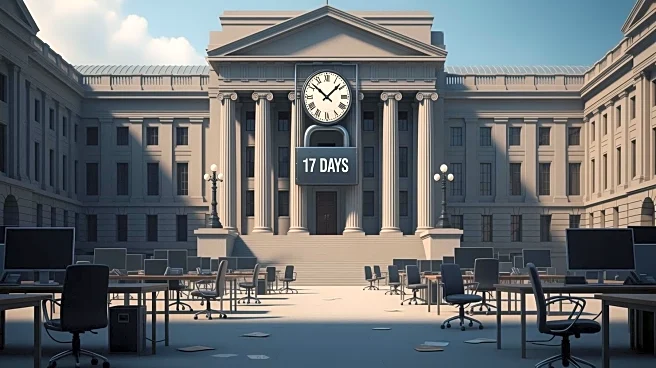What's Happening?
The U.S. government is experiencing its longest full shutdown in history, with funding lapsing for 17 consecutive days. This has resulted in hundreds of thousands of federal workers, including congressional
staffers, being furloughed or working without pay. The previous record for a government-wide funding lapse was 16 days in fiscal 2014. Speaker Mike Johnson has warned that the country is heading towards one of the longest shutdowns unless Democrats drop their demands. The shutdown has raised concerns about potential travel disruptions during Thanksgiving, with House GOP leaders highlighting the risk of flight cancellations and delays. Democrats blame Republicans for the impasse, while Republicans argue that Democrats need to accept a clean funding stopgap.
Why It's Important?
The prolonged shutdown has significant implications for U.S. politics and society. Federal workers are facing financial uncertainty, and essential services may be disrupted. The shutdown could impact travel during the busy Thanksgiving period, affecting millions of Americans. Politically, the shutdown highlights deep divisions between Democrats and Republicans, with each side blaming the other for the stalemate. The situation underscores the challenges in reaching bipartisan agreements on funding and policy issues, potentially affecting public trust in government institutions.
What's Next?
Lawmakers are considering several dates as potential breakthroughs in the funding gridlock. Republicans hope Democrats will concede after the 'No Kings' protests against the Trump administration, while Democrats are focusing on November 1, the start of open enrollment under the Affordable Care Act, as a pressure point for negotiations. The possibility of a shutdown lasting beyond Thanksgiving raises concerns about extended disruptions. Legislative efforts to resolve the shutdown may involve passing minibuses to open portions of the government incrementally, though Democrats have expressed skepticism about this approach.
Beyond the Headlines
The shutdown raises ethical and cultural questions about the impact on federal workers and the functioning of government. The financial strain on workers and the disruption of services highlight the human cost of political impasses. The situation may lead to long-term shifts in public perception of government efficiency and accountability, influencing future political discourse and policy-making.











